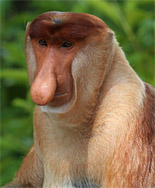Get
To Know
|
 The
Proboscis Monkey or long nosed monkey is a reddish brown arboreal
Old World monkey that is endemic to the southeast Asian island of
Borneo. They also go by the Malay name monyet belanda (Dutch monkey)
as Indonesians remarked that the Dutch colonisers often had similarly
large bellies and noses. Males have a maximum known weight of 30
kg while Females weigh 7 to 12 kg, with a maximum known mass of
15 kg. The large nose of the male can exceed 10.2 cm in length and
hangs lower than the mouth. They live most commonly in coastal areas
and along rivers. They favour dipterocarp, mangrove and riverine
forests. It is perhaps the most aquatic of the primates and is a
fairly good swimmer, capable of swimming up to 20 m underwater and
have been known to swim across rivers. They have a long coat; the
fur on the back is bright orange, reddish brown, yellowish brown
or brick-red. Their face is orange-pink and the male has a red penis
with a black scrotum. Both sexes have bulging stomachs that give
the monkeys what resembles a pot belly and many of the monkeys'
toes are webbed. Females become sexually mature at five years old
and copulations tend to last for half a minute with both sexes participating
although now always successfully. Perhaps this is because the male
will grab the female by the ankles or torso and mount her from behind.
It likely doesn't help that when soliciting sexual attention, both
sexes will pouted, the males will sometimes vocalize, the females
will present their backsides, and mating pairs are sometimes harassed
by subadults. Proboscis monkeys eat primarily fruit and leaves,
but will also eat flowers, seeds and insects to a lesser extent.
Their daily activities consist of resting, traveling, feeding and
keeping vigilant. As night approaches, the monkeys move back near
the river and forage again. The proboscis monkey is assessed as
Endangered and its total population has decreased by more than 50%
in the past 36-40 years to 2008 due to ongoing habitat loss and
hunting in some areas. The largest remaining populations are found
in Kalimantan; there are far fewer in Sarawak, Brunei and Sabah. The
Proboscis Monkey or long nosed monkey is a reddish brown arboreal
Old World monkey that is endemic to the southeast Asian island of
Borneo. They also go by the Malay name monyet belanda (Dutch monkey)
as Indonesians remarked that the Dutch colonisers often had similarly
large bellies and noses. Males have a maximum known weight of 30
kg while Females weigh 7 to 12 kg, with a maximum known mass of
15 kg. The large nose of the male can exceed 10.2 cm in length and
hangs lower than the mouth. They live most commonly in coastal areas
and along rivers. They favour dipterocarp, mangrove and riverine
forests. It is perhaps the most aquatic of the primates and is a
fairly good swimmer, capable of swimming up to 20 m underwater and
have been known to swim across rivers. They have a long coat; the
fur on the back is bright orange, reddish brown, yellowish brown
or brick-red. Their face is orange-pink and the male has a red penis
with a black scrotum. Both sexes have bulging stomachs that give
the monkeys what resembles a pot belly and many of the monkeys'
toes are webbed. Females become sexually mature at five years old
and copulations tend to last for half a minute with both sexes participating
although now always successfully. Perhaps this is because the male
will grab the female by the ankles or torso and mount her from behind.
It likely doesn't help that when soliciting sexual attention, both
sexes will pouted, the males will sometimes vocalize, the females
will present their backsides, and mating pairs are sometimes harassed
by subadults. Proboscis monkeys eat primarily fruit and leaves,
but will also eat flowers, seeds and insects to a lesser extent.
Their daily activities consist of resting, traveling, feeding and
keeping vigilant. As night approaches, the monkeys move back near
the river and forage again. The proboscis monkey is assessed as
Endangered and its total population has decreased by more than 50%
in the past 36-40 years to 2008 due to ongoing habitat loss and
hunting in some areas. The largest remaining populations are found
in Kalimantan; there are far fewer in Sarawak, Brunei and Sabah.
|
|
|
|
Grease Poet
By
Richard King Perkins II
Carl the mechanic
was the first poet
I ever met-
livin' at home
takin' a few classes
at the local CC
I think us younger guys
in the neighborhood
kinda looked up to him
because he was sort
of a regular guy
but when he
came out cryin' one day
and showed us his
first publication
he sniffed that he'd
tried to show
his old man
what he'd done
and all the old drunk
could do was laugh
and drip snot
all over the pages
Carl said this was typical
of how people
treated poets
which was why I knew
I'd never be one
so I asked Carl
to pop the hood
of the Charger
and show me
the spark plugs
or something.
Richard King Perkins II is a state-sponsored advocate
for residents in long-term care facilities. He lives in Crystal Lake,
IL with his wife, Vickie and daughter, Sage. He is a three-time Pushcart
nominee and a Best of the Net nominee whose work has appeared in more
than a thousand publications. In a six-year period, his poems have appeared
in The Louisiana Review, Bluestem, Emrys Journal, Sierra Nevada Review,
Roanoke Review, The Red Cedar Review and Crannog. He has
poems forthcoming in The William and Mary Review, Sugar House Review,
Old Red Kimono and Milkfist. He was a recent finalist in
The Rash Awards, Sharkpack Alchemy, Writer’s Digest and Bacopa Literary
Review poetry contests.
|
 The
Proboscis Monkey - Issue Twenty-Two
The
Proboscis Monkey - Issue Twenty-Two